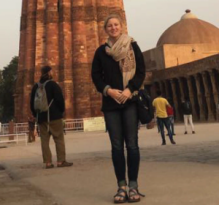BA in Asian Studies
Our Asian Studies Program BA has a flexible and adaptable course framework. You decide which Asian language (Arabic, Chinese, Hindi, Japanese, Korean) and which region of Asia most interests you, and then you develop your academic plan from there! You are required to take 4 semesters of an Asian language, and you can focus on history, language, culture, health, gender, popular culture or develop a broader understanding as you take your required upper level electives. Our BA adapts well to transferring courses from other academic institutions, and can be particularly useful for students with an Excelsior scholarship because it does not prescribe particular courses for the BA. Study abroad is supported and recommended here – and we work with you to maximize the transfer of credits into your major.
Please contact our Director of Undergraduate Studies for information about the major or assistance in applying to the major.
Major Requirements
Total credit hours: 49
- Core Courses (7 credit hours)
- AS 101: Introduction to Asian Studies (1 credit hour)
- AS 181 or AS 182: Asian Civilization I or II
- AS 221 Survey of Asian Literature or AS 229 Contemporary Asian Societies
- To be accepted into the major, a grade of C (2.0) or higher must be achieved in at least two of the core courses.
- Language Proficiency (18 credit hours).
- Students are required to take four semesters of an Asian language other than their native language or demonstrate intermediate-level proficiency equivalent to two years of classroom language study at UB. Students who are able to demonstrate intermediate-level proficiency in an Asian language other than their native language may petition the Asian Studies Program Director of Undergraduate Studies to replace the required language study with upper-level electives, with the general principle that each year of language study will be replaced by two 3-hour courses in the upper-level elective category. At most two semesters of language study can be replaced by content courses.
- Upper Level Electives (21 credit hours)
- Approved, 300/400-level courses, of which 9 credit hours must relate to the culture or region of the language selected. Courses must include a more or less equal number of social sciences and humanities courses. Maximum of two courses may be shared with another major or minor, including 300/400-level language courses unless they are used for a language minor.
- Capstone Course (3 credit hours)
- AS 498 Senior Research
- Research, writing, and oral presentation of a research project are carried out under the guidance of a faculty member.
- To graduate, a minimum grade of 1.67 (C-) is required in any course in the major, with an overall minimum GPA of 2.0 in the major.
Declare a Major
Incoming Students: Apply to the University at Buffalo
Apply to UB. When applying, you should indicate your intended major on the application form.
Current Students: Request to Change to the Major or Minor
Submit the CAS Major/Minor Change Request form to request one of the following changes to your academic plan:
- Add a major, minor, or certificate in the College of Arts and Sciences
- Drop any major
- Drop any minor
Asian Studies BA Stories

Name: Kayleigh Reed
Major: Asian Studies & English
Minor: Classics
Kayleigh Reed graduated from UB in 2018 with a double major in Asian Studies and English. She studied abroad in India during the 2016-2017 academic year. Courtney Locke (AS ’18) interviewed Kayleigh and wrote the following profile.
Interview by C. Locke ’18.
Reed was awarded the prestigious David L. Boren Scholarship, The CET-University of Wisconsin Joseph W. Elder Scholarship, as well as a national scholarship for her study abroad program. Reed’s study abroad was also supported in part by the Asian Studies Program Study Abroad Award , which is available to all UB undergraduates wishing to study abroad in Asia.
Where did you study abroad?
I studied in Lucknow and Varanasi, India in 2016- 2017.
Families often worry about the safety of students while studying abroad. Did you ever feel unsafe while traveling in India?
I felt very safe in India, with few exceptions. The big cities can be quite alarming to the senses and I felt a bit bewildered at times, but never fearful.
What did you do during free time?
Hung out with friends or host family, visited parks and gardens, or saw movies. I was also able to travel to various other Indian cities as doing so was very inexpensive.
Did you feel any homesickness? How did you overcome these feelings?
Fall 2017 was the first period lengthy travel abroad for me, and I found myself missing home quite often. Thankfully, I have FaceTime so I was able to communicate regularly with my parents when I felt homesick. The spring semester I found myself feeling less homesick than before.